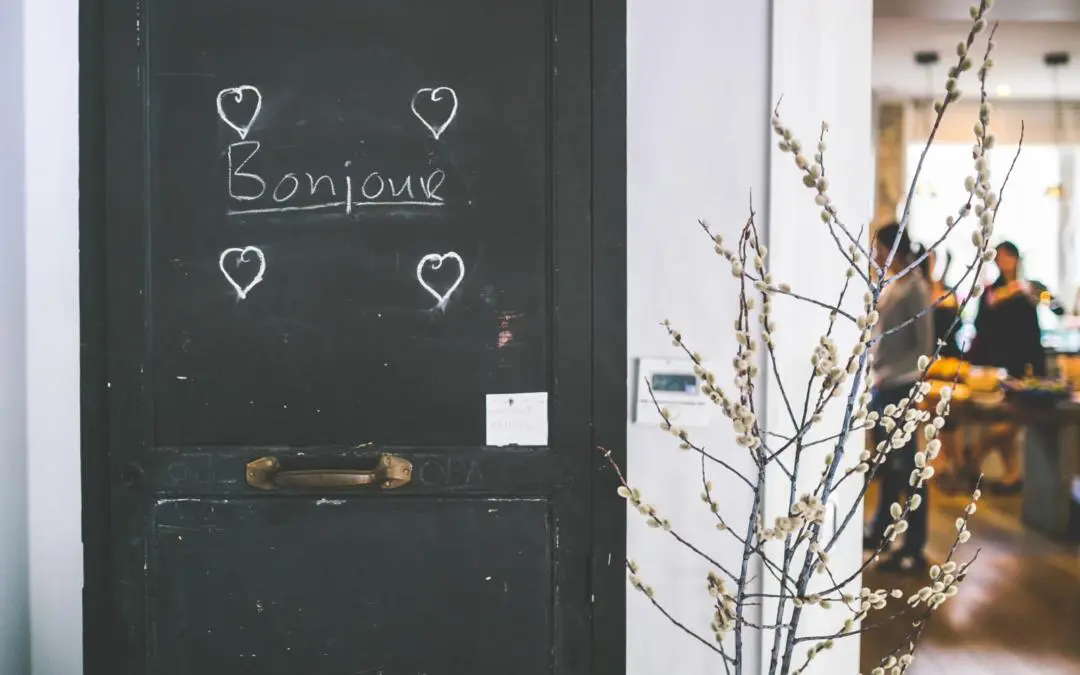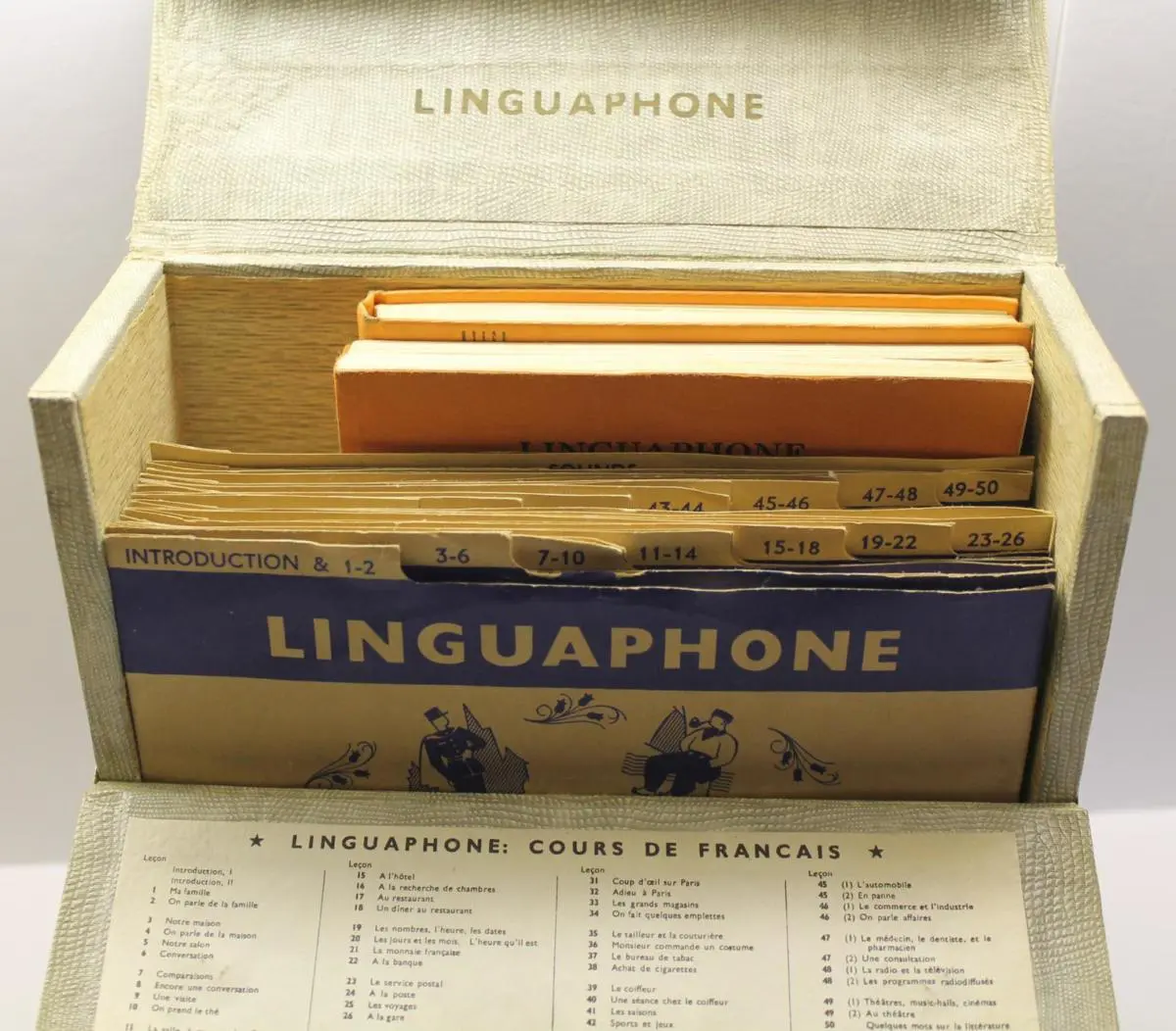Are you looking to perfect your French or just achieve the basic survival level? Wherever you are along the learning curve, you’re going to need a game plan. Mastering French doesn’t happen on its own – it takes time, effort and commitment.
You didn’t learn to ride a bicycle just by admiring your shiny new birthday gift, did you? No, it took hard work, dedication and lots of falling. And it took practicing everyday, starting out slow, suffering several hours of trial and error, before you got to take off those training wheels.
Learning French is exactly the same, minus the need for a helmet! It’s entirely a question of persistence and time.
As the image below shows (thanks to AI language coach Kwiziq), climbing the language mountain takes time. Each new plateau represents a new level. Have you heard those discouraging myths like, “I’m too old to learn a new language” or “I don’t have a good ear”? The language mountain contradicts those myths and shows that success depends essentially on the number of hours spent learning. After only 25 hours of French lessons, you can reach the A1 level. And you can reach C1 level or “Effective Operational Proficiency” after 600 hours of study. This is why patience and strategy are key if you’re aiming for fluency.
Courtesy of Kwiziq (https://www.kwiziq.com/)
Strategy
Your language learning game plan should always begin with a self-assessment.
What is your motivation? WHY are you learning French in the first place? This is important and will serve as permanent catalyst in your language learning journey. Along the way you’ll stumble on obstacles, lose patience, and wonder if all the effort is even worth it. That’s when you need to remember your WHY.
If you have recently renested in France or are planning to move in the future, here are some important reasons to learn French:
- Life is (MUCH) easier and it’s more practical when you want to get things done.
- You can avoid costly errors because you understand what you’re being asked/offered/sold.
- You can discover a new side to your personality, your French self.
- Integration and making friends with the locals becomes possible!
What are your objectives? Is your goal to get by comfortably in daily life situations? What are you goals in terms of reading, writing, oral comprehension and expression? Do you want to attain fluency? As your objectives become clearer, so will the program you need to put into place to achieve them.
During your self-assessment, think about your own personal learning style, learning ability and physical ability. Are you an oral or visual learner? Are you going to do homework? Do you have any impairments that might require additional or specific exercises? You also need to be honest with yourself about your availability. How many hours per week are you prepared to dedicate to learning French? Would you rather commit to a long-term program or sign up for an short but intensive one? And finally, as you do your self-assessment, it’s key to take your own personality into consideration. Are you shy or more of an extravert? Will you be comfortable in a group class with other participants you don’t know?
Once you’ve completed your self-assessment or done a French language assessment with Renestance, you can start building the strategy to achieve your objectives. You can choose among numerous language learning options today, but they all produce different results for different learners. Here is an overview of the pros and cons of the various options available today.
Private Lessons
The obvious advantages of taking one-to-one classes is they can be 100% tailored to your style and goals. For example, if you only want to work on pronunciation, the teacher can gear subject matter, activities and out of class practice to that specific objective.
However, the quality of private lessons and how much you enjoy them has everything to do with the teacher. Since there are no other students to add to the conversation and serve as examples, the lessons rely completely on the teacher’s dynamism and skill. Students can progress quickly, but private lessons may lack the energy of group classes.
Group Classes
Language schools, non-profit language clubs and independent language instructors offer a variety of group classes for every budget. Although groups can include people from various ages and origins, you can find programs that are specifically geared towards professionals, seniors, families, children, teens, etc. The different personalities and learning styles, working together, makes for a lively classroom environment. Group classes provide the opportunity for various role playing and conversation activities that are not as interesting in a one-to-one context.
Learning a language in a group class also means that you can learn from others’ trials and errors. The teacher must be on top of things and diplomatically point out the errors so everyone can learn in a comfortable environment.
If you’re more of an introvert, you might find it difficult to get the teacher’s attention or enough speaking time with this format. It depends on the size of the class and homogeneity of the students’ levels. In any case, the instructor will teach to the majority level. So, if you’re way ahead, you might get bored (this can be compensated with additional homework and self-paced study). On the other hand, if you’re a bit behind, you might experience frustration (however, this too can be balanced out with self-paced study).
Immersion
Full immersion programs are considered much more effective than even long-term programs for a couple hours per week. Going back to the Language Learning mountain, it’s a question of how much time you put in, but also of intensity. With immersion, you progress quickly because you put in more hours over a short period of time.
Immersion programs also offer the opportunity to experience the language and the culture in its entirety. You actually LIVE the language. From cooking classes and wine tastings to museum visits and meet-ups with natives, you continuously observe, learn from example and progress in a super fun way. The best immersion programs offer a little bit of everything – both proper language lessons (grammar instruction, pronunciation practice, etc.) and cultural experiences with opportunities to practice in real life settings. When you learn in context, the brain enjoys it and stores the information more easily.
The cons of Immersion programs are the investment – both in time and money. Not everyone can take a month off to dedicate to learning French. It also demands a lot of hard work and dedication. It can be very draining and intense. It’s like building muscle. You don’t get great biceps by just looking at the dumbbells!
Language Exchange
Language exchange or meetups, groups like Franglish and Wegolingo, are often the most inexpensive option (free!) where you share conversation with francophones who would like to improve another language like English.
These events often take place in bars or cafés and attract a diverse crowd in a positive atmosphere. The drawbacks include the noise level, making it hard to understand your partner, and the lack of formal teaching.
Language exchanges, either through an organized group or an informal meetup where you can exchange bilingual conversation for free, is a great way to complement your daily program. It can also be an integral part of self-paced study.
Self-paced Study
With all the books, online programs, applications, online tutors, forums and other various language learning tools available today, you can learn to speak French without ever setting a foot in a classroom. HOWEVER, without tremendous self-motivation, discipline and daily exercise, self-paced study can make learning French look a lot like that treadmill, bought with the best intentions, collecting dust in the garage.
Coupled with one-to-one Skype lessons with a native speaker, daily workbook exercises, weekly language exchange meet-ups, apps and online programs can be a very efficient strategy to learning.
Online programs like Babbel or subscription programs like Rosetta Stone and Berlitz cost between €5 and €18 a month. With just a click your PC, tablet or smartphone can instantly turn into a amazingly rich language school. The best programs offer fun games, images, listening and speaking exercises (that we used to do in a language lab!) and various other activities without translating into your native language.
Insider Advice
Insider Advice
When I first moved to France, after studying and majoring in French in college, I found that real life was nothing like the text books had depicted. Today it is much easier to get the gist of native-speaking situations even before your arrival.
If I may leave you with a few tidbits of advice that I’ve learned over the years as a language learner and foreign language teacher:
- Be intentional about why you want to learn, where you want to end up and what your action plan is to get there.
- Observe: listen to natives, notice their body language and copy them. That’s how you learned your native tongue, isn’t it? Off you go to a side-walk café – people watching at its best!
- Conversation! Conversation! Conversation! Unless you want to become a translator or write a book in French, you are probably going to want to focus on communicating with others.
- Get over it! You’re going to make mistakes. You’re going to say silly things. Get used to it and don’t fret it. One of the reasons that children progress faster than adults is that they don’t care about making mistakes or looking silly. There’s no secret, if you don’t dare speak out of fear, you’ll never improve.
- Mix it up. Having a multi-dimensional learning strategy will allow you to address all of the different aspects of the language. So, don’t hesitate to dip into all of the different learning options available.
- Have FUN! At the end of the day, there is no secret formula, as long as you are consistent and enjoying yourself. The perfect language program is the one that you are most passionate about.
Learning to speak a language, like learning to ride a bike, takes lots of effort and daily practice, but your reward is the pleasure of effortlessly coasting down the hill.
If you’d like guidance on how best to approach your own French language learning, don’t hesitate to contact Renestance for your personal French Language Assessment. We can help you develop a program that fits your needs, schedule and budget, and we partner with effective language teachers and institutes.
Jennifer was Renestance's Activity & Excursions Coordinator between 2015 and 2020, a bilingual American from Vermont who's been loving her life in France since 1998. She was passionate about sharing her knowledge and allowing you to discover all of the scenic, cultural and culinary wealth of the Languedoc-Roussillon region.
All articles by: Jennifer Rowell-Gastard








